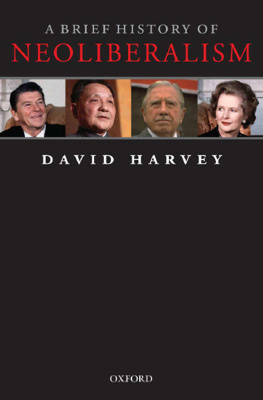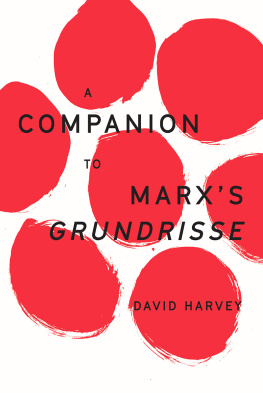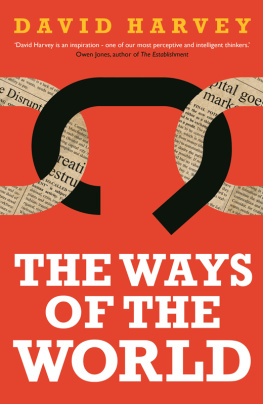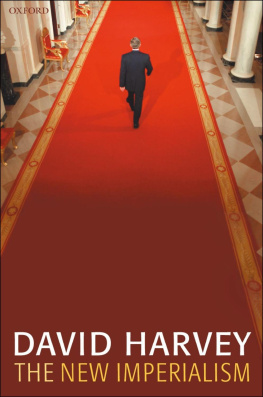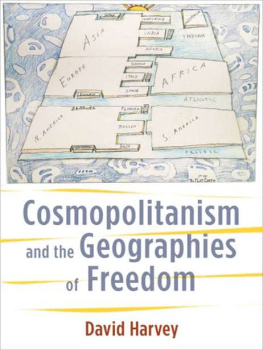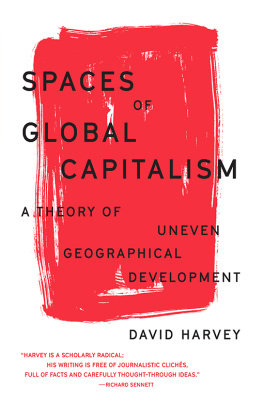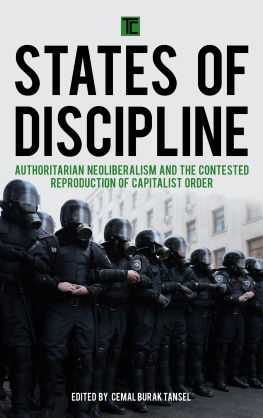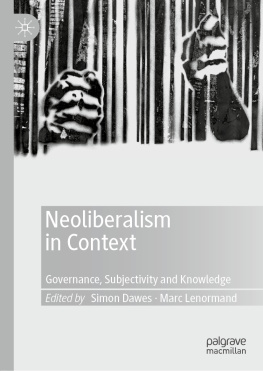A Brief History of Neoliberalism
A Brief History of
Neoliberalism
David Harvey


Great Clarendon Street, Oxford OX2 6DP
Oxford University Press is a department of the University of Oxford.
It furthers the Universitys objective of excellence in research, scholarship,
and education by publishing worldwide in
Oxford New York
Auckland Cape Town Dar es Salaam Hong Kong Karachi
Kuala Lumpur Madrid Melbourne Mexico City Nairobi
New Delhi Shanghai Taipei Toronto
With offices in
Argentina Austria Brazil Chile Czech Republic France Greece
Guatemala Hungary Italy Japan Poland Portugal Singapore
South Korea Switzerland Thailand Turkey Ukraine Vietnam
Oxford is a registered trade mark of Oxford University Press
in the UK and in certain other countries
Published in the United States
by Oxford University Press Inc., New York
David Harvey 2005
The moral rights of the author have been asserted
Database right Oxford University Press (maker)
First published 2005
First published in paperback 2007
All rights reserved. No part of this publication may be reproduced,
stored in a retrieval system, or transmitted, in any form or by any means,
without the prior permission in writing of Oxford University Press,
or as expressly permitted by law, or under terms agreed with the appropriate
reprographics rights organization. Enquiries concerning reproduction
outside the scope of the above should be sent to the Rights Department,
Oxford University Press, at the address above
You must not circulate this book in any other binding or cover
and you must impose this same condition on any acquirer
British Library Cataloguing in Publication Data
Data available
Library of Congress Cataloging in Publication Data
Data to follow
Typeset by RefineCatch Limited, Bungay, Suffolk
Printed in Great Britain
on acid-free paper by
Clays Ltd, St Ives plc
ISBN 0199283265 9780199283262
ISBN 0199283273 (Pbk.) 9780199283279 (Pbk.)
EAN 978 0 19 928326 2
1 3 5 7 9 10 8 6 4 2
Contents
Figures and Tables
Figures
Tables
Acknowledgements
are reproduced by kind permission of the Guilford Press from P. Dicken, Global Shift: Reshaping the Global Economic Map in the 21st Century. 4th Edition, 2003.
is reproduced courtesy of MIT Press Journals from Thomas Piketty and Emmanuel Saez, Income Inequality in the United States, 19131988, The Quarterly Journal of Economics, 118:1 (February, 2003).
is reproduced courtesy of J. Perloff from Wu, X and Perloff, J, Chinas Income Distribution over Time: Reasons for Rising Inequality. CUDARE Working Papers 977.
is reproduced courtesy of Verso Press from R. Pollin, Contours of Descent, 2003.
reprinted by permission of the publisher from Capital Resurgent: Roots of the Neoliberal Revolution by Grard Dumnil and Dominique Lvy, translated by Derek Jeffers, Cambridge, Mass.: Harvard University Press, Copyright 2004 by the President and Fellows of Harvard College.
is reproduced courtesy Blackwell Publishing from S. Corbridge, Debt and Development, 1993.
Introduction
Future historians may well look upon the years 197880 as a revolutionary turning-point in the worlds social and economic history. In 1978, Deng Xiaoping took the first momentous steps towards the liberalization of a communist-ruled economy in a country that accounted for a fifth of the worlds population. The path that Deng defined was to transform China in two decades from a closed backwater to an open centre of capitalist dynamism with sustained growth rates unparalleled in human history. On the other side of the Pacific, and in quite different circumstances, a relatively obscure (but now renowned) figure named Paul Volcker took command at the US Federal Reserve in July 1979, and within a few months dramatically changed monetary policy. The Fed thereafter took the lead in the fight against inflation no matter what its consequences (particularly as concerned unemployment). Across the Atlantic, Margaret Thatcher had already been elected Prime Minister of Britain in May 1979, with a mandate to curb trade union power and put an end to the miserable inflationary stagnation that had enveloped the country for the preceding decade. Then, in 1980, Ronald Reagan was elected President of the United States and, armed with geniality and personal charisma, set the US on course to revitalize its economy by supporting Volckers moves at the Fed and adding his own particular blend of policies to curb the power of labour, deregulate industry, agriculture, and resource extraction, and liberate the powers of finance both internally and on the world stage. From these several epicentres, revolutionary impulses seemingly spread and reverberated to remake the world around us in a totally different image.
Transformations of this scope and depth do not occur by accident. So it is pertinent to enquire by what means and paths the new economic configurationoften subsumed under the term globalizationwas plucked from the entrails of the old. Volcker, Reagan, Thatcher, and Deng Xaioping all took minority arguments that had long been in circulation and made them majoritarian (though in no case without a protracted struggle). Reagan brought to life the minority tradition that stretched back within the Republican Party to Barry Goldwater in the early 1960s. Deng saw the rising tide of wealth and influence in Japan, Taiwan, Hong Kong, Singapore, and South Korea and sought to mobilize market socialism instead of central planning to protect and advance the interests of the Chinese state. Volcker and Thatcher both plucked from the shadows of relative obscurity a particular doctrine that went under the name of neoliberalism and transformed it into the central guiding principle of economic thought and management. And it is with this doctrineits origins, rise, and implications that I am here primarily concerned.
Neoliberalism is in the first instance a theory of political economic practices that proposes that human well-being can best be advanced by liberating individual entrepreneurial freedoms and skills within an institutional framework characterized by strong private property rights, free markets, and free trade. The role of the state is to create and preserve an institutional framework appropriate to such practices. The state has to guarantee, for example, the quality and integrity of money. It must also set up those military, defence, police, and legal structures and functions required to secure private property rights and to guarantee, by force if need be, the proper functioning of markets. Furthermore, if markets do not exist (in areas such as land, water, education, health care, social security, or environmental pollution) then they must be created, by state action if necessary. But beyond these tasks the state should not venture. State interventions in markets (once created) must be kept to a bare minimum because, according to the theory, the state cannot possibly possess enough information to second-guess market signals (prices) and because powerful interest groups will inevitably distort and bias state interventions (particularly in democracies) for their own benefit.
There has everywhere been an emphatic turn towards neoliberalism in political-economic practices and thinking since the 1970s. Deregulation, privatization, and withdrawal of the state from many areas of social provision have been all too common. Almost all states, from those newly minted after the collapse of the Soviet Union to old-style social democracies and welfare states such as New Zealand and Sweden, have embraced, sometimes voluntarily and in other instances in response to coercive pressures, some version of neoliberal theory and adjusted at least some policies and practices accordingly. Post-apartheid South Africa quickly embraced neoliberalism, and even contemporary China, as we shall see, appears to be headed in this direction. Furthermore, the advocates of the neoliberal way now occupy positions of considerable influence in education (the universities and many think tanks), in the media, in corporate boardrooms and financial institutions, in key state institutions (treasury departments, the central banks), and also in those international institutions such as the International Monetary Fund (IMF), the World Bank, and the World Trade Organization (WTO) that regulate global finance and trade. Neoliberalism has, in short, become hegemonic as a mode of discourse. It has pervasive effects on ways of thought to the point where it has become incorporated into the common-sense way many of us interpret, live in, and understand the world.
Next page
